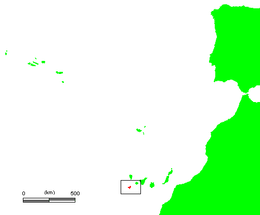El Hierro
| Nickname: Isla del Meridiano | |
|---|---|
 |
|
| Geography | |
| Location | Atlantic Ocean |
| Coordinates | 27°45′N 18°00′W / 27.750°N 18.000°WCoordinates: 27°45′N 18°00′W / 27.750°N 18.000°W |
| Archipelago | Canary Islands |
| Area | 268.71 km2 (103.75 sq mi) |
| Highest elevation | 1,501 m (4,925 ft) |
| Highest point | Pico de Malpaso |
| Administration | |
|
Spain
|
|
| Autonomous Community | Canary Islands |
| Province | Santa Cruz de Tenerife |
| Largest settlement | Valverde (pop. 5,797) |
| Demographics | |
| Population | 10,162 (2003) |
| Pop. density | 37 /km2 (96 /sq mi) |
El Hierro, nicknamed Isla del Meridiano (the "Meridian Island"), is the smallest and farthest south and west of the Canary Islands (an Autonomous Community of Spain), in the Atlantic Ocean off the coast of Africa, with a population of 10,162 (2003). Its capital is Valverde. At 268.71 square kilometres, it is the smallest of the seven main islands of the Canaries.
The name El Hierro, although spelled like the Spanish word for 'iron', is not related to that word. The H in the name of the metal is derived from the F of Latin ferrum (compare higa for 'fig'). The H in the name of the island dates back to the time in Old Spanish orthography when the distinction between the letters I and J was not yet established and a silent h was written before word-initial ie to ensure that the i was read as a semivowel, not as the consonant [ʒ].
The confusion with the name of the metal had effects on the international naming of the island. As early as the 16th century, maps and texts called the island after the word for 'iron' in other languages: Portuguese Ferro, French l'île de Fer, and Latin Insula Ferri.
Nevertheless, the origin of the name ero or erro or yerro is not definitely known. It is thought to be derived from one of several words in the Guanche language of the pre-Hispanic inhabitants, known as Bimbaches. Juan de Abreu Galindo (in a manuscript translated and published by George Glas in 1764) gives the native name of the island as Esero (or ), meaning 'strong'. Richard Henry Major, however, in notes on his translation of Le Canarien, observes that the Guanche word hero or herro, meaning 'cistern', could easily have lapsed into hierro by a process of folk etymology. It is believed that the Bimbaches had to construct cisterns to save fresh rainwater. The Gran diccionario guanche gives the meaning of the Guanche word hero in Spanish as "fuente" ('spring [water source]').
...
Wikipedia

